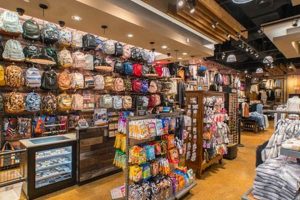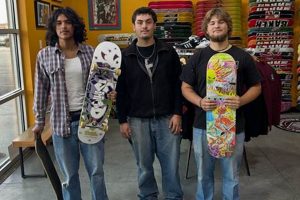Establishments in the specified geographic area that provide skateboarding equipment, apparel, and related services constitute a vital component of the local skateboarding community. These retail outlets offer a range of products, from skateboards and components to protective gear and footwear. As an example, individuals seeking new skateboard decks or replacement wheels might visit these stores to fulfill their requirements.
The presence of such businesses is crucial for supporting and fostering skateboarding activities within the region. These entities not only provide necessary supplies but often serve as gathering points for skaters, contributing to the social fabric of the community. Furthermore, they may play a role in promoting the sport through sponsorships, events, and collaborations. Historically, these retail locations have adapted to changing trends and technologies within the skateboarding industry, ensuring continued relevance and service to local enthusiasts.
Therefore, a detailed examination of the landscape of these establishments, including their offerings, community involvement, and impact on the local skateboarding scene, warrants further exploration. A comprehensive overview will shed light on their role in facilitating and enriching the skateboarding experience for individuals within the area.
Skateboarding Equipment Selection and Maintenance Guidance
The following recommendations address crucial aspects of skateboard ownership, focusing on equipment selection, maintenance, and safety considerations to ensure optimal performance and longevity of skateboarding equipment.
Tip 1: Board Selection Based on Rider Level and Style: Choose skateboard decks and components appropriate for the rider’s skill level and intended use. Beginners may benefit from wider decks and softer wheels for stability, while experienced skaters might opt for narrower decks and harder wheels for technical tricks. For example, street skaters often prefer smaller wheels, whereas transition skaters might select larger wheels for increased speed.
Tip 2: Truck Maintenance and Adjustment: Regularly inspect skateboard trucks for wear and tear. Tighten or loosen the kingpin nut to adjust turning responsiveness. Over-tightening can damage bushings, while excessive looseness compromises stability. Consistent lubrication of pivot cups prevents squeaking and ensures smooth turning.
Tip 3: Wheel Condition Monitoring and Rotation: Monitor wheel wear patterns. Rotate wheels periodically to distribute wear evenly, extending their lifespan. Replace wheels when they become excessively worn or chipped, as this can affect performance and safety. Consider the durometer of the wheel when selecting replacements to suit the intended skating surface.
Tip 4: Bearing Cleaning and Lubrication: Clean skateboard bearings regularly to remove dirt and debris that can hinder performance. Use a solvent to dissolve grime, and re-lubricate with a bearing lubricant. Properly maintained bearings enhance speed and reduce friction, contributing to a smoother ride.
Tip 5: Hardware Inspection and Replacement: Check all nuts and bolts regularly to ensure they are securely fastened. Replace any stripped or damaged hardware immediately. Loose hardware can lead to instability and potential accidents. Upgrading to high-quality hardware can improve overall board performance and durability.
Tip 6: Protective Gear Assessment and Proper Fit: Always wear appropriate protective gear, including a helmet, knee pads, elbow pads, and wrist guards. Ensure that the gear fits properly and is in good condition. Replace damaged or worn protective gear promptly. Prioritizing safety minimizes the risk of injury during skateboarding activities.
Adhering to these recommendations can significantly enhance the skateboarding experience. Consistent attention to equipment selection, maintenance, and safety contributes to improved performance, extended equipment lifespan, and reduced risk of injury.
The subsequent sections will delve into the specifics of the skateboarding community and resources available within the defined geographical area.
1. Local Skateboarding Community Hubs
Retail locations specializing in skateboarding equipment within the Tampa area function as critical community hubs. These establishments transcend the role of mere commercial entities, actively cultivating social connections and facilitating the exchange of knowledge among skateboarding enthusiasts. A direct causal relationship exists between the presence of well-managed skate shops and the strength of the local skateboarding community. The former directly fosters the latter by providing a physical space for interaction and a source of expertise.
The importance of these hubs lies in their multifaceted contributions. Beyond the sale of skateboards, apparel, and accessories, they often organize events such as skate jams, contests, and workshops. These activities promote skill development, create opportunities for peer learning, and foster a sense of belonging. Many establishments also serve as information centers, providing guidance on local skate spots, upcoming events, and safety protocols. For example, a shop might host a weekly beginner’s clinic or sponsor a local skate team, further solidifying its role as a community pillar.
The practical significance of understanding this connection is evident in its implications for community development. Recognizing skate shops as vital community assets encourages local support and investment. Municipalities can partner with these businesses to promote skateboarding as a healthy and accessible activity. By fostering a thriving skateboarding community, the associated benefits, such as increased physical activity, social interaction, and creative expression, are amplified. The interconnectedness between skate shops and the local community is a critical factor in sustaining and growing the skateboarding scene.
2. Specialized Equipment Availability
The availability of specialized skateboarding equipment within retail establishments in Tampa is crucial for catering to the diverse needs and skill levels of the local skateboarding community. These specialty items support advanced techniques and cater to preferences, underscoring the role of well-stocked local shops.
- Diverse Deck Selection
Local retail outlets offer a broad range of skateboard decks, varying in width, length, concave, and construction materials. This assortment enables skaters to select decks optimized for specific skateboarding disciplines, such as street skating, park skating, or transition skating. Availability ensures skaters find equipment to enhance performance.
- Truck and Wheel Customization
The capacity to customize skateboard trucks and wheels is paramount for achieving optimal performance. These shops supply various truck sizes, bushing durometers, and wheel diameters and durometers, empowering skaters to fine-tune their setups. A rider seeking increased stability might opt for wider trucks, while one prioritizing speed would choose larger diameter wheels. These details underscore the importance of a retail environment capable of offering these options and providing guidance.
- Specialized Hardware and Bearings
Beyond the primary components, a complete inventory comprises specialized hardware such as high-grade bolts, bearing spacers, and speed rings. These components contribute to the overall performance and longevity of the skateboard. Bearings, in particular, are available in various precision ratings (ABEC) and materials, impacting speed and smoothness. Retailers stock to address a spectrum of rider concerns.
- Protective Gear Options
Specialized equipment also includes protective gear tailored to the needs of skateboarders. This encompasses helmets, knee pads, elbow pads, wrist guards, and mouthguards, designed to mitigate the risk of injury. The presence of shops offering a diverse selection of properly fitted protective gear is paramount to promoting safety.
The collective availability of these specialized components in area skate shops directly impacts the growth and development of the skateboarding community, fostering an environment where skaters can access the tools necessary to progress and excel. These retail points support the skateboarding infrastructure and the individuals involved.
3. Expert Advice Provision
Retail establishments specializing in skateboarding equipment located within the Tampa region play a crucial role in the dissemination of expert knowledge. This advisory function extends beyond the mere transaction of goods, encompassing guidance on equipment selection, maintenance procedures, and safe skateboarding practices. The availability of informed staff within these retail locations directly affects the overall proficiency and safety of the local skateboarding community. For instance, a novice skater might receive guidance on selecting a board appropriate for their skill level and intended use, preventing the purchase of equipment that is ill-suited and potentially unsafe. Similarly, experienced skaters can benefit from informed discussions regarding the latest advancements in skateboard technology and techniques, allowing them to optimize their performance.
The provision of expert advice also extends to troubleshooting equipment-related issues. Staff members can diagnose problems with trucks, wheels, and bearings, offering solutions ranging from simple adjustments to component replacements. This service is particularly valuable for skaters who lack the technical expertise to perform these repairs themselves, ensuring that their equipment remains in optimal condition. Further, shops that prioritize advice provision frequently host workshops and demonstrations, educating skaters on board maintenance, trick techniques, and injury prevention. Such initiatives foster a sense of community and promote responsible skateboarding practices, indirectly benefitting the retail establishment through increased customer loyalty and positive word-of-mouth referrals.
In summary, the presence of knowledgeable staff within retail skateboarding locations constitutes a critical component of a thriving skateboarding ecosystem. The guidance provided directly impacts the skill development, safety, and overall enjoyment of skaters within the Tampa area. Recognizing the value of expert advice encourages support for local establishments that prioritize education and customer service. Ultimately, such investment benefits both the skateboarding community and the retailers who serve it, creating a positive feedback loop that fosters the growth of the sport.
4. Event Sponsorship Activities
Event sponsorship represents a critical avenue through which skateboarding retail establishments in Tampa contribute to and benefit from the local skateboarding culture. These sponsorships are not merely acts of altruism, but strategic investments that yield tangible returns for both the shops and the community they serve.
- Financial Support for Local Competitions
Sponsorships often involve direct financial contributions to local skateboarding competitions and events. This support can cover venue rental, prize money, insurance costs, and promotional expenses. For example, a shop might sponsor a “best trick” contest at a local skatepark, providing cash prizes and merchandise to the winners. Such financial backing ensures the event’s viability and enhances its appeal, attracting a larger audience and generating positive exposure for the sponsoring shop.
- Provision of Product Prizes and Merchandise
In addition to direct financial support, sponsorships frequently entail the provision of product prizes and merchandise for event participants. This can include skateboards, wheels, trucks, apparel, and other skateboarding-related accessories. These contributions serve as attractive incentives for skaters to participate in events and showcase their skills. The merchandise also serves as a form of advertising, increasing brand awareness and promoting sales within the community. Example: A local skate shop provides a skateboard deck to the best performing participant.
- Community Building and Brand Loyalty
Event sponsorships play a crucial role in building a sense of community among local skateboarders. By supporting events, retailers demonstrate their commitment to the sport and its participants. This fosters a sense of loyalty among skaters, who are more likely to patronize shops that actively support the community. Example: A local skate shop sponsors an event to repair skate park that generates positive brand awareness.
- Marketing and Advertising Opportunities
Event sponsorships provide valuable marketing and advertising opportunities for retail establishments. Shops can display their logos and banners at events, distribute promotional materials, and interact directly with potential customers. This exposure increases brand visibility and reinforces the shop’s presence within the community. Sponsorships can lead to media coverage, further amplifying the marketing impact. Example: Skate shop logos at the end of a promotional video of the competition increases the popularity.
The symbiotic relationship between skateboarding retail establishments and event sponsorships underscores the interconnectedness of the local skateboarding ecosystem. Shops benefit from increased brand awareness and customer loyalty, while the community benefits from well-supported events that promote skill development and foster a sense of belonging. These investments help the sustained growth of the local skateboarding scene.
5. Regional Skateboarding Growth
Regional skateboarding growth is inextricably linked to the presence and viability of local retail establishments that specialize in skateboarding equipment. These shops function as foundational support structures, enabling participation and fostering the expansion of skateboarding activities within a defined geographical area. Their impact is multifaceted, extending beyond mere commerce to encompass community building, skill development, and the promotion of skateboarding culture.
- Equipment Accessibility and Affordability
The presence of conveniently located retail outlets ensures that skateboarding equipment remains accessible to individuals within the region. These shops offer a range of products at varying price points, accommodating diverse economic circumstances. Accessibility directly impacts participation rates, with a greater availability of affordable equipment leading to increased involvement in skateboarding activities. Example: Skate shops providing beginner skateboard kits will increase participation.
- Development of Skateboarding Infrastructure
Skate shops Tampa often play a vital role in advocating for and supporting the development of skateboarding infrastructure within the region. This may involve lobbying local governments for the construction of skateparks, organizing fundraising events to support skatepark projects, and collaborating with community organizations to promote skateboarding as a positive recreational activity. Improved infrastructure attracts more skaters, expanding the regional skateboarding community. Example: Skate shops Tampa will organize an event to repair a public skate park.
- Promotion of Skateboarding Culture and Education
Retail establishments serve as conduits for skateboarding culture, disseminating information about skateboarding history, techniques, and safety practices. Shops may host workshops, demonstrations, and film screenings to educate skaters and promote responsible skateboarding practices. The cultivation of a positive and informed skateboarding culture contributes to the long-term growth and sustainability of the sport within the region. Example: A skate shop could hold a free skateboard maintenance seminar.
- Supporting Local Talent and Competition
Skate shops frequently sponsor local skateboarders, providing financial support, equipment, and exposure to up-and-coming talent. They may also organize or sponsor skateboarding competitions and events, providing opportunities for skaters to showcase their skills and compete against their peers. The support of local talent fosters a sense of community and incentivizes skaters to improve their abilities, thereby contributing to the overall growth of skateboarding within the region. Example: A local skate shop could provide discounts and skateboarding gears to local skateboarders.
The interrelated nature of these elements underscores the significance of skate shops in Tampa as catalysts for regional skateboarding growth. Their function extends beyond the sale of products, encompassing active participation in community development, infrastructure support, and the cultivation of a vibrant skateboarding culture. The continued success and proliferation of these retail establishments is directly proportional to the expansion and sustainability of skateboarding within the region.
Frequently Asked Questions Regarding Skate Shops in Tampa
This section addresses common inquiries regarding skateboarding retail establishments in the Tampa area, providing clear and concise information to enhance understanding of their role and function.
Question 1: What types of products are typically stocked by skate shops in Tampa?
Skate shops in Tampa commonly stock a range of products, including complete skateboards, decks, trucks, wheels, bearings, hardware, and protective gear. Additionally, apparel and footwear specifically designed for skateboarding are generally available.
Question 2: Do skate shops in Tampa offer repair services for skateboards?
Many skate shops in Tampa provide repair services, encompassing tasks such as replacing broken decks, mounting new trucks, changing wheels, and servicing bearings. The availability and scope of repair services may vary by establishment.
Question 3: Can skate shops in Tampa provide guidance on selecting the appropriate skateboard equipment?
Skate shops in Tampa are typically staffed by knowledgeable individuals capable of offering expert advice on selecting skateboard equipment that aligns with individual skill levels, skating styles, and intended usage scenarios.
Question 4: Do skate shops in Tampa sponsor local skateboarders or skateboarding events?
Some skate shops in Tampa actively sponsor local skateboarders and skateboarding events, providing financial support, equipment, and promotional assistance. This sponsorship contributes to the growth and development of the regional skateboarding community.
Question 5: Are there skate shops in Tampa that offer skateboarding lessons or workshops?
Certain skate shops in Tampa may offer skateboarding lessons or workshops, catering to beginners and experienced skaters alike. These educational programs provide opportunities to learn new skills and improve existing techniques.
Question 6: How can one locate reputable skate shops in Tampa?
Reputable skate shops in Tampa can be located through online searches, recommendations from local skateboarders, and reviews on online platforms. Factors to consider when evaluating a skate shop include product selection, staff expertise, customer service, and community involvement.
The information provided herein offers a foundational understanding of the resources and services offered by skateboarding retail locations within the specified area. Awareness of these establishments facilitates participation and contributes to the health of the local skateboarding culture.
The following sections will address further elements of this topic, offering an exhaustive overview to improve knowledge and promote engagement within the Tampa skateboarding context.
Conclusion
The preceding analysis has explored the function of skateboard retail locations in the Tampa region. Emphasis has been placed on these establishments’ contributions to equipment accessibility, community engagement, skilled guidance, event facilitation, and overall promotion of skateboarding within the area. Skate shops tampa are integral for the prosperity and ongoing development of skateboarding participation.
The ongoing presence and assistance of these establishments remain critical. Continued backing of skate shops tampa will encourage the ongoing maturation of skateboarding, providing a foundation for the next cohort of skaters and supporting a vibrant community.







